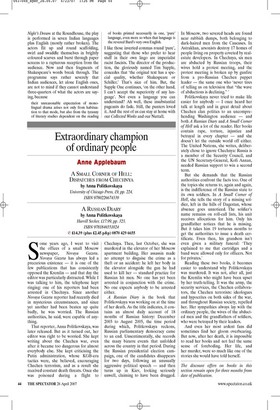Extraordinary champion of ordinary people
Anne Applebaum
A SMALL CORNER OF HELL: DISPATCHES FROM CHECHNYA by Anna Politkovskaya University of Chicago Press, £9, pp. 224, ISBN 9780226674339 A RUSSIAN DIARY by Anna Politkovskaya Harvill Secker, £17.99, pp. 323, ISBN 9781846551024 ✆ £14.39 (plus £2.45 p&p) 0870 429 6655 Some years ago, I went to visit the offices of a small Moscow newspaper, Novaya Gazeta. Novaya Gazeta has always led a precarious existence — it is one of the few publications that has consistently opposed the Kremlin — and that day the editor was particularly distracted. While I was talking to him, the telephone kept ringing: one of his reporters had been arrested in Chechnya. Since another Novaya Gazeta reporter had recently died in mysterious circumstances, and since yet another had been beaten up quite badly, he was worried. The Russian authorities, he said, were capable of anything.
That reporter, Anna Politkovskaya, was later released. But as it turned out, her editor was right to be worried. She kept writing about the Chechen war, even after it became too dangerous for almost everybody else. She kept criticising the Putin administration, whose KGB-era tactics were, she believed, encouraging Chechen terrorism, and as a result she received constant death threats. Once she was poisoned during a flight to Chechnya. Then, last October, she was murdered in the elevator of her Moscow apartment building. Her assassin made no attempt to disguise the crime as a theft or an accident: he left her body in the elevator alongside the gun he had used to kill her — standard practice for Russian hit men. No one has yet been arrested in conjunction with the crime. No one expects anybody to be arrested either.
A Russian Diary is the book that Politkovskaya was working on at the time of her death. As the title indicates, it contains an almost daily account of 18 months of Russian history: December 2003 to August 2005, the time period during which, Politkovskaya reckons, Russian parliamentary democracy came to an end. Unsentimentally, she records the many bizarre events that unfolded across the country in that period. During the Russian presidential election campaign, one of the candidates disappears for two days, following an unusually aggressive political speech — and then turns up in Kiev, looking seriously unwell, claiming to have been drugged. In Moscow, two severed heads are found near rubbish dumps, both belonging to dark-haired men from the Caucuses. In Astrakhan, arsonists destroy 17 homes of people living on property coveted by realestate developers. In Chechnya, six men are abducted by Russian troops, their wives hold a protest meeting, and the protest meeting is broken up by gunfire from a pro-Russian Chechen puppet leader — the same one who ‘never tires of telling us on television that “the wave of abductions is declining.” ’ Politkovskaya never tried to make life easier for anybody — I once heard her talk at length and in great detail about Chechen clan politics to an uncomprehending Washington audience — and both A Russian Diary and A Small Corner of Hell ask a lot of the reader. Her books contain rape, torture, injustice and betrayal in every chapter — and she doesn’t let the outside world off either. The United Nations, she writes, deliberately chose to ignore Chechnya: Russia is a member of the Security Council, and the UN Secretary-General, Kofi Annan, needed Russian support to win a second term.
But she demands that the Russian authorities confront the facts too. One of the topics she returns to, again and again, is the indifference of the Russian state to its own soldiers. In A Small Corner of Hell, she tells the story of a missing soldier, left in the hills of Dagestan, whose absence goes unnoticed. The soldier’s name remains on roll-call lists, his unit receives allocations for him. Only his grandfather notices that he is missing. But it takes him 19 tortuous months to get the authorities to issue a death certificate. Even then, his grandson isn’t even given a military funeral: ‘They explained to me that cartridges and a band were allowed only for officers. Not for privates.’ Reading these two books, it becomes easier to understand why Politkovskaya was murdered. It was not, after all, just the Kremlin who might have been upset by her truth-telling. It was the army, the security services, the Chechen collaborators, the Chechen terrorists: ideologues and hypocrites on both sides of the war, and throughout Russian society, repelled her. Her sympathies always lay with the ordinary people, the wives of the abducted men and the grandfathers of soldiers, who were betrayed by their leaders.
And even her most ardent fans did sometimes find her gloom overbearing. But now, after her death, it is impossible to read her books and not feel the same sense of foreboding. Her life, and her murder, were so much like one of the stories she would have told herself.
The discount offers on books in this section remain open for three months from date of publication.
























































 Previous page
Previous page